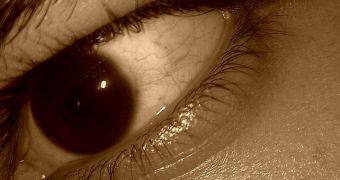An international team of researchers announces promising results with a new electronic device, which they say can be implanted in patients suffering from retinal dystrophy, restoring at least partial sight.
The results are very important, because they could potentially change the lives of over 15 million people, which suffer from this terrible disease all around the world.
In the new investigations, a series of volunteers suffering from hereditary retinal dystrophy (HRD) were implanted with light-sensitive, externally-powered microchips, which featured arrays of diodes on their surfaces.
The researchers behind the work say that each of the microchips carries as much as 1,500 photosensitive diodes, which are used to convert light into electrical signals.
The fact that scientists have something to go on in their fight against this terrible condition is an achievement in itself. HRD leads to the progressive degeneration of photoreceptor cells on the retina, and results in blindness in most cases.
Scientists in Germany, at the University of Tübingen, say that their chip is implanted in the retina right in the sport where the regular photoreceptor cells should have been.
In other words, they swap the cells for the diodes, says team leader Eberthart Zrenner. When light enters the eyes and reaches the diodes, it generates an electrical signal, that is then transmitted through the normal optical channels to the visual cortex.
All that is needed for the diodes to work is an external power source. Electricity is provided to the electronic devices via a wire running through the eye.
All of the three volunteers that received the implants thus far were able to distinguish bright objects, and one of team even became capable of reading large words and recognizing the shapes of large objects.
In a paper published in the October 13 issue of the esteemed scientific journal Proceedings of the Royal Society B, the researches explain that they took out the implants from the volunteers as a safety measure.
However, the team has already started work on developing a permanent implant, for which they are still waiting on approval, New Scientist reports.
But retinal implants are not the only avenue of research in treating blindness. Other researchers are working on using video cameras mounted on glasses to relay electrical signals to the optical nerves.

 14 DAY TRIAL //
14 DAY TRIAL //